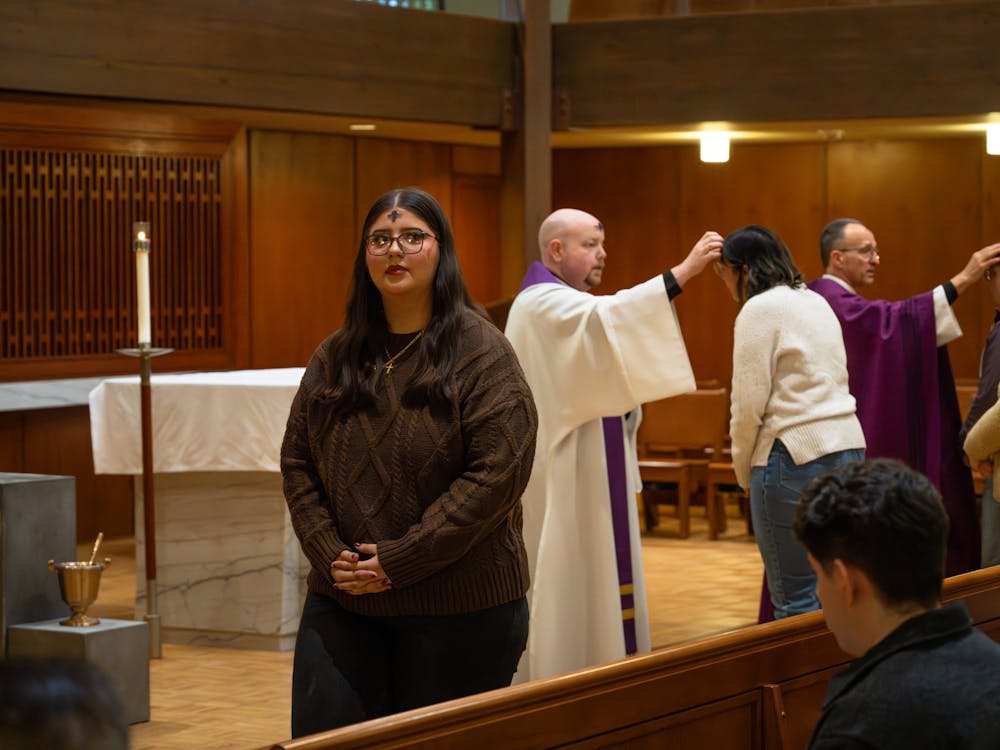The new Roman Missal reflects a patriarchal standard embedded in the Catholic Church
Kevin Hershey (-- The Beacon)
By Kevin Hershey
Several Sundays ago marked the beginning of a major transition for observant Catholics: our first time using the newly translated Roman Missal. For those of you who may not be up on your Church lingo: The prayers and responses said at Mass have been retranslated so that they more accurately reflect their original Latin text. Maybe it doesn't sound like a big deal, but this means changing deep-seated habits that many of us have practiced since we learned how to speak.
Needless to say, the Chapel of Christ the Teacher was full of laughter as we struggled together with this new tongue twister, breaking away from old habits and making some new ones.
One of our old habits, however, cannot seem to leave us: sexism.
Yes, the Catholic Church has a history of excluding women and asserting male dominance, despite its teachings of social justice. With the latest translation of the Nicene Creed (that's when we state our core beliefs together as a community of faith), our language remains outwardly patriarchal.
We say together in the Creed that God "came down from heaven for us MEN and our salvation."
When did we all become men? Has the Church decided the mere nature of woman is so sinful that Jesus does not offer them salvation? I doubt it.
I can only assume that the Vatican is using "men" as a synonym for "humans" without considering the highly sexist implications of their wording. It seems that the male-dominated worldview of the Vatican is so narrow that their definition of humanity excludes half of the world's human population. Coincidence? I think not.
This choice of words reflects the patriarchal nature of our Church that we Catholics should not accept.
Vatican officials seem to think that as men, it is fair for them to apply their sex to the entire Catholic community. How convenient for them.
This assumption could not be more false, as I generally see more women than men filling the pews on Sunday. These women of faith look pretty silly saying "for us men" when it is clear that they are not men.
It would be just as ridiculous if the Creed read, "for us white men and our salvation." That would be racist.
Or what if we said, "for us wealthy men and our salvation?" That would be classist.
How about, "us women and our salvation?" That would be excluding half of the Church's followers. Wait. Does that sound familiar?
Some might use the argument that this is only a word- its just language, no big deal. I certainly hope that students, faculty and staff at our writing-embedded university have come to realize that words and language are indeed a big deal. Many scholars would argue that language and words in fact dictate the way we think and reflect what we value.
Consider some of the words that educated, well-meaning people in today's society would never use. "Negro," for example, is a word that is not inherently bad, but we do not use it because it brings us back to a time in which African-Americans were second-class citizens.
Nor do we say "Jap" because it connotes a time when Japanese-Americans were forced into internment camps.
Why, then, do we continue to use the word "men" to describe those humans that Jesus came to save? This brings us back to a time in which women had no rights.
Perhaps our language in Mass reflects the fact that women still have few rights in the Church today.
To those who would argue that words are just words and carry no weight, can we agree that there are certain types of words that are completely inappropriate to use at church? Would I ever enter a confessional and say, "Forgive me, Father for I have f***ed up. It's been a week since my last confession." Never! But isn't f***ing up the same as sinning? More or less, but I do not use the word because it is vulgar and disrespectful.
Well, doesn't "men" mean the same thing as "humans"? Maybe so, but we should not use it because it disrespects and excludes the women in our faith community.
The Church continues to hold onto many of its beautiful traditions, but my hope is that we can let go of our ugly tradition of sexism. As Catholics try to fight for what is right, it is important that we reexamine our own culture and institution so that we may include all people.
Kevin Hershey is a senior Spanish major. He can be contacted at hershey12@up.edu.








